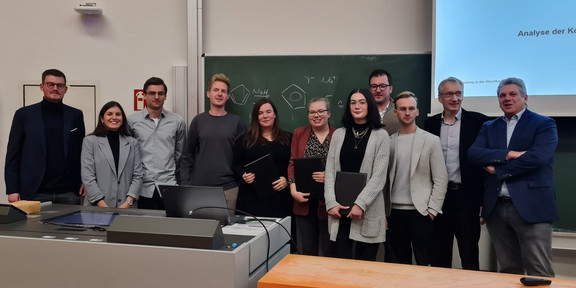PwC award ceremony summer semester 2023

On November 28, 2023, the auditing and consulting firm PricewaterhouseCoopers presented awards for the best theses in the fields of controlling, accounting, auditing and taxation at the Faculty of Business Administration and Economics at TU Dortmund University. For the 30th award ceremony, for the first time only female winners were selected from all students who wrote their final thesis in the subjects of Corporate Accounting and Controlling, International Accounting and Auditing and Corporate Taxation in summer semester 23.
In her Bachelor's thesis "Sustainability reporting and the resilience orientation of companies", Lilian Huber examines the correlation between sustainability and resilience. She works out that an orientation towards these two concepts can both ensure the long-term success of a company and strengthen its ability to adapt, react and withstand future crises. On the basis of the analysis, corporate sustainability reporting can be assessed as an instrument that promotes resilience, as it can fundamentally facilitate the development of resilience factors within the company. A possible positive influence was identified with regard to the resilience factors examined, such as resource capacity, sustainability performance, innovation performance and supply chain relationships.
The bachelor thesis "Development of an Excel tool for personnel capacity management at Siemens AG" by Dorina Dölle is dedicated to the specific problem of a lack of quantitative determination of the personnel capacity and utilization of project managers at Siemens AG Düsseldorf. The requirements were jointly formulated in an interview with the manager concerned at and supplemented by findings from current research. Once the tool had been created, the evaluation was tested quantitatively for its accuracy and qualitatively for its informative value with satisfactory results. The resulting tool enables managers to create a comparison and graphical presentation of target, actual, planned and potential hours at the required aggregation level, differentiated by division. This automation saves around 36 man-days per year. In future, the evaluation is to be extended to other branches and additional groups of employees.
Laura Sophie Freitag examined the "Restructuring of municipal utilities" in her master's thesis. For the descriptive research interest, the application status was first presented and the necessity of restructuring at municipal utilities was derived. Primary data was collected with the help of expert interviews and evaluated using a qualitative content analysis according to Mayring. The central research result of the master's thesis is the need for proactive restructuring of municipal utilities due to the current challenges. Municipal utilities must position themselves for the future and act preventively in order to avoid a corporate crisis caused by these difficulties. Although restructuring is associated with numerous risks, it is emphasized that the opportunities clearly outweigh the risks. Based on this insight, the ideal-typical procedure for a restructuring project is based on the state of application, includes key success factors and is characterized by the integration of controlling.
Sina Neumann wrote her master's thesis on "Analysis of the group tax rates of DAX and MDAX companies for the period 2016-2022". Based on company data from DAX and MDAX companies, possible relationships between the group tax rate and other variables were investigated and systematic correlations uncovered. With regard to the expected tax rates, a further result of this work is that the expected tax rate according to the homebased approach permanently overestimates the group tax rate, while the expected tax rate according to the weighted average tax rate method, on the other hand, continuously underestimates the group tax rate. Another aspect of the analysis was the examination of a possible correlation between the group tax rate and the size of a group. Although no statistically significant correlations were found, trends were certainly discernible. According to this, the largest companies had the lowest median group tax ratios, regardless of the chosen measure of size categorization (balance sheet total, sales revenue and number of employees).
We would like to congratulate the winners and wish them all the best for the future!

